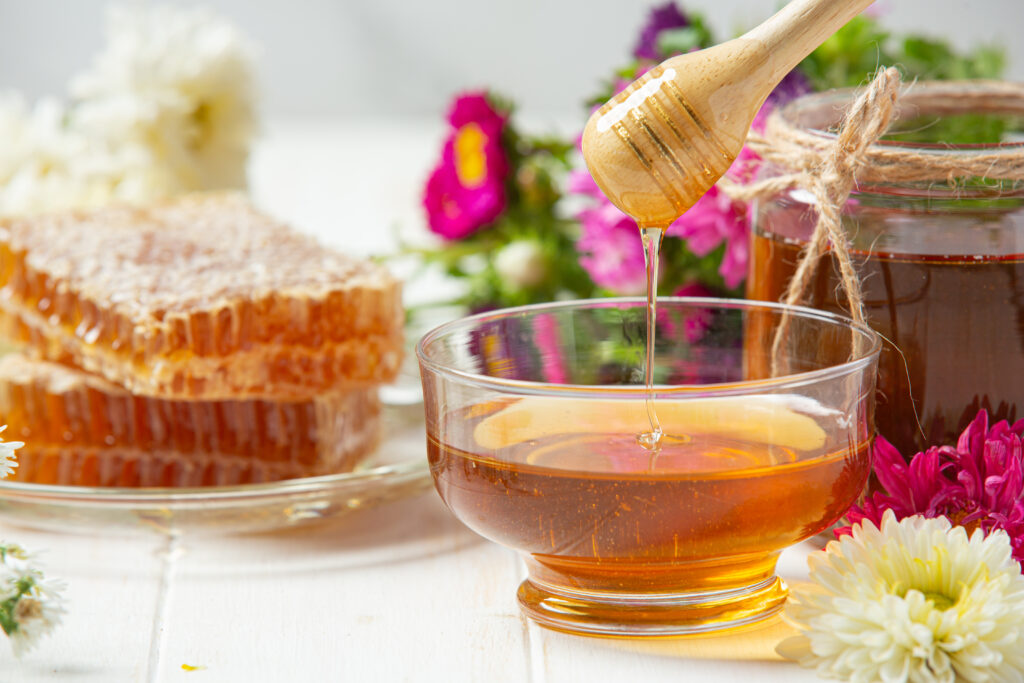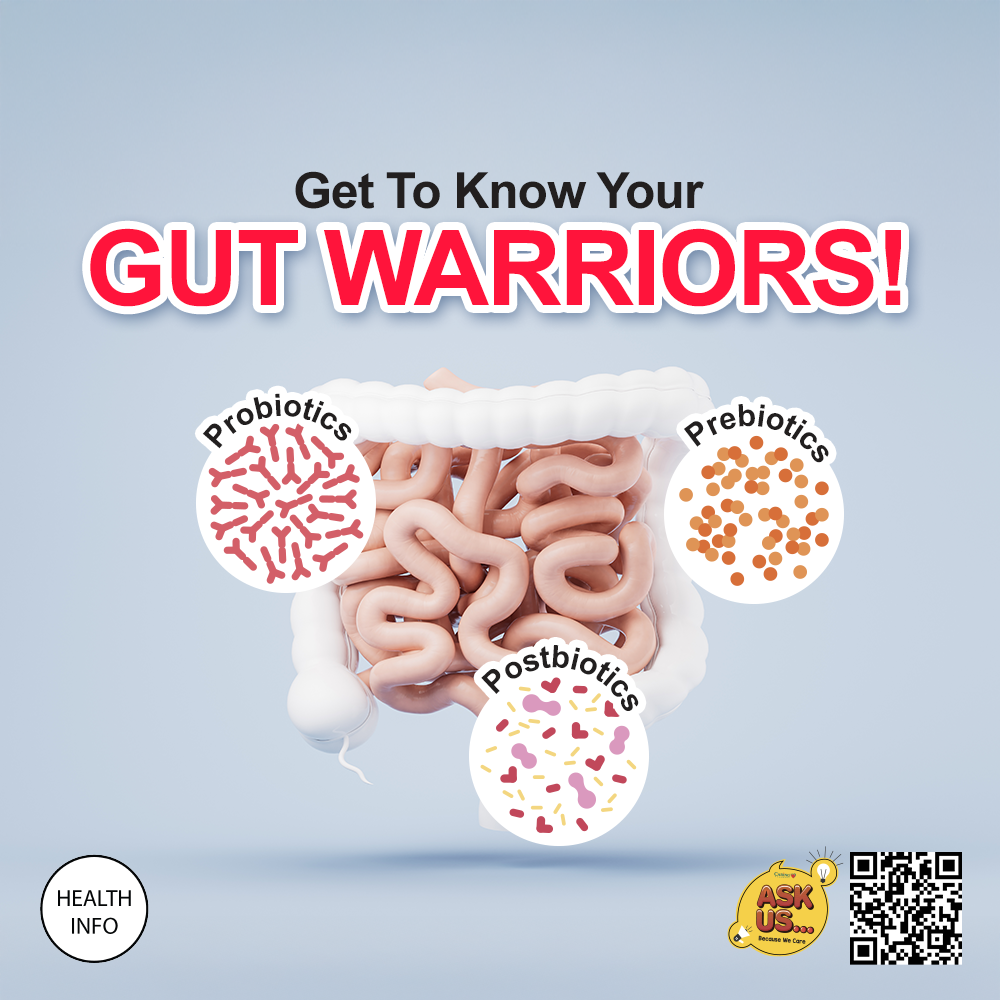- Home
- Health Center
- Health Info
- The Buzz About Manuka Honey and Propolis
Manuka
The Buzz About Manuka Honey and Propolis


Bees have blessed mankind with their honey and propolis for thousands of years, with honey being used topically for wound treatment by Egyptians, Greeks, Romans and Chinese from over 600 years ago. More popularly known now for its antibacterial effects, Manuka honey is a dark mono-floral honey produced from the nectar of flowers of Manuka trees in New Zealand and eastern Australia.1,2
The Methylglyoxal (MGO) in Manuka Honey
All the hype around manuka honey centers around the methylglyoxal (MGO) which gives rise to the honey’s antibacterial effects. In fact, the higher the MGO, the stronger its antibacterial activity. It is most popularly known for its ability in treating burns, wounds and ulcers through facilitating tissue growth and wound debridement as well as reducing inflammation.3 That being said, the jar of manuka honey in the kitchen should not be a major part of one’s first aid kit.
Benefits of Manuka Honey
The MGO in manuka honey is nothing without its plethora of phytochemical sidekicks such as flavonoids, phenolic compounds and defensins. They work synergistically with MGO to combat germs and give its antioxidant effect, which protects our cells from free radical damage. This kind of oxidative stress is linked to debilitating conditions such as high cholesterol, heart disease, cancer, arthritis, respiratory diseases, immune deficiency, and other inflammatory conditions.4,5 As an oral health booster, manuka honey may soothe coughs, sore throats, inflamed gums, and other periodontal conditions.6,7 Also, it may improve digestive health and ease bacteria-related digestive disorder such as acid reflux, stomach ulcers and stomach aches.8 However, note that honey is still an added sugar, hence consumption should be limited.
Manuka Honey Grades: MGO vs UMF
While the benefits are clear, the varying degrees of manuka honey is classified by its MGO or Unique Manuka Factor (UMF). The MGO rating merely states the amount of MGO in honey. Conversely, UMF indicates the quality and authenticity of manuka honey and reflects the amount of tested antibacterial activity via its content of Leptosperin, Dihydroxyacetone (DHA) and MGO. The UMF rating is only given to honey tested and verified by a laboratory licensed by Active Manuka Honey Association (AMHA).9,10

Comparison of MGO and UMF, taken from Manuka Health New Zealand.11
What is Bee Propolis?
Bee propolis is a remarkable resin-like substance made by bees to build their hives. Commonly sold in capsules, sprays, topical products, toothpaste, mouthwashes and honey, propolis contains over 300 compounds, most of which are antioxidants that fight oxidative stress and inflammation.12-14
Benefits of Propolis
Propolis is reported to have activity against bacteria, viruses, fungi and intestinal parasites in the context of oral, skin, gut and vaginal health, making it a great immune booster. Its anti-inflammatory and antioxidant effects may help fight chronic conditions such high cholesterol, diabetes, heart diseases and brain-related disorders such as Parkinson’s, Alzheimer’s and multiple sclerosis. In skin health, propolis may aid diabetic and acne wound healing. Interestingly, some studies identify propolis as complementary anti-cancer treatment in suppressing tumor growth.12-14
Now, thousands of years after its discovery, we still look to the healthy goodness of bee produce. Manuka honey and propolis are excellent health boosters sold in pharmacies for those looking for all-rounder health supplements. Be sure to visit a CARiNG Pharmacy store to learn more!
References:
- The Anti-Inflammatory and Antibacterial Action of Nanocrystalline Silver and Manuka Honey on the Molecular Alternation of Diabetic Foot Ulcer: A Comprehensive Literature Review. KK Tsang et al. (2015). Evidence-Based Complementary and Alternative Medicine. Web link: https://www.hindawi.com/journals/ecam/2015/218283/
- Honey: A Biologic Wound Dressing. P Molan and T Rhodes. (Web Accessed May 2021). Web link: https://www.woundsresearch.com/article/honey-biologic-wound-dressing
- Traditional and Modern Uses of Natural Honey in Human Diseases: A Review. T Eteraf-Oskouei, M Najafi. (2013). Iranian journal of basic medical sciences. Web link: https://www.ncbi.nlm.nih.gov/pmc/articles/PMC3758027/
- The Composition and Biological Activity of Honey: A Focus on Manuka Honey. JM Alvarez-Suarez et al. (2014). Foods. Web link: https://www.ncbi.nlm.nih.gov/pmc/articles/PMC5302252/
- Antibacterial activity of varying UMF-graded Manuka honeys. A Girma, W Seo, and RC She. (2019). PLoS One. Web link: https://www.ncbi.nlm.nih.gov/pmc/articles/PMC6814216/
- The effects of manuka honey on plaque and gingivitis: a pilot study. HK English, AR Pack and PC Molan. (2004). Journal of the International Academy of Periodontology. Web link: https://pubmed.ncbi.nlm.nih.gov/15125017/
- Manuka honey inhibits the development of Streptococcus pyogenes biofilms and causes reduced expression of two fibronectin binding proteins. SE Maddocks et al. (2012). Microbiology. Web link: https://pubmed.ncbi.nlm.nih.gov/22294681/
- Everything You Should Know About Manuka Honey. E Connor. (Web Accessed May 2021). Web link: https://www.healthline.com/health/manuka-honey
- UMF And MGO Manuka Honey Ratings Compared. Comvita Australia. (Web Accessed May 2021). Web link: https://www.comvita.com.au/blog-article/umf-and-mgo-manuka-honey-ratings-compared/3200397
- Frequently Asked Questions about Manuka Honey. Manuka Honey Ltd. (Web Accessed May 2021) Web link: https://manukahoney.co.uk/info/faqs.html
- What is MGO? Manuka Health New Zealand. (Web Accessed May 2021) Web link: https://www.manukahealth.co.nz/en-nz/manuka-honey/what-is-mgo/
- The Benefits and Uses of Propolis. R Goldman. (Web Accessed May 2021). Web link: https://www.healthline.com/health/propolis-an-ancient-healer
- Honey, Propolis, and Royal Jelly: A Comprehensive Review of Their Biological Actions and Health Benefits. VR Pasupuleti et al. (2017). Oxid Med Cell Longev. Web link: https://www.ncbi.nlm.nih.gov/pmc/articles/PMC5549483/#:~:text=Propolis%20and%20its%20extracts%20have,%2C%20anticancer%2C%20and%20immunomodulatory%20properties
- Evidence on the Health Benefits of Supplemental Propolis. A Braakhuis. (2019). Nutrients. Web link: https://www.ncbi.nlm.nih.gov/pmc/articles/PMC6893770/
Latest Health Info
Ladies, Let’s Bring Out The Beauty In You
Ladies, Let’s Bring Out The Beauty In You As women juggle the demands of work, family, and personal health, taking ...
Healthy Weight, Happy Joints
How Does Weight Affect Knee Health? The Link Between Pounds And Pain Osteoarthritis (OA) involves the degeneration of joints, which ...
The Gut Warriors: Prebiotics, Probiotics and Postbiotics
When it comes to gut health, you’ve probably heard of prebiotics and probiotics. But did you know there’s also ...



